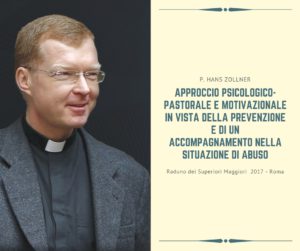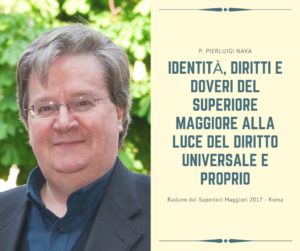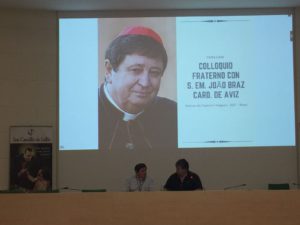 After the prayers and the celebration of the Eucharist in the early morning, those taking part in the meeting of the major Superiors of the Order proceeded to welcome Fr. Hans Zollner, a Jesuit religious, the director of the Faculty of Psychology of the Gregorian University of Rome and the founder and director of the Centre for Child Protection (CCP). This was the moment to complete what had already been addressed on Sunday 25 June regarding the ‘thorny, painful and impelling’ question of the defence and protection of minors and vulnerable people against sexual abuse. Fr. Zollner engaged in this exchange of views with a psychological-pastoral and motivational approach to prevention and the accompanying of the victims of abuse.
After the prayers and the celebration of the Eucharist in the early morning, those taking part in the meeting of the major Superiors of the Order proceeded to welcome Fr. Hans Zollner, a Jesuit religious, the director of the Faculty of Psychology of the Gregorian University of Rome and the founder and director of the Centre for Child Protection (CCP). This was the moment to complete what had already been addressed on Sunday 25 June regarding the ‘thorny, painful and impelling’ question of the defence and protection of minors and vulnerable people against sexual abuse. Fr. Zollner engaged in this exchange of views with a psychological-pastoral and motivational approach to prevention and the accompanying of the victims of abuse.
Fr. Zollner emphasised the absolute need to receive and listen to victims in a profoundly empathetic way. He described some details of the meetings of Pope Francis with many victims of sexual abuse: deep and participatory listening with intense involvement; listening extended in time to the point that after some time has passed the Pope asks, and informs himself, about their situation and their lives.
The aim is to continue to be sensitised, to grow at the level of information and formation in order to have an increasing knowledge of the gradualness of the processes involved and to organise in an effective way the steps that have to be taken.
The commonplaces of this subject were addressed. They are often used so as not to speak, not to look for the truth of the facts: this is a problem of the West, it does not exist here; the abuse of minors is prohibited in our culture; with others it is worse (in other religions, in the world of sport…); there are so many false accusations; the mass media want to destroy the Church; a rhetorical reduction of the causes of the phenomenon to homosexuality alone or to the celibacy of priests…
Fr. Zollner addressed the ‘conceptual confusion’ that makes its way into general understanding when this phenomenon is addressed: sexual abuse v. physical abuse v. emotional abuse v. spiritual abuse; paedophilia-ephebophilia; paedo/pornography and the use of the media; moral responsibility; the priority commitment of prevention-protection (safeguarding); relationships with the media and care in the ‘correct’ use of words and terms when this phenomenon is approached…
Another important aspect connected with this subject is the quality of the formation of candidates for priestly life and religious life and their ongoing formation. Reference should be made in particular to number 2020 of the new Ratio fundamentalis institutionis sacerdotalis which was recently promulgated (8 December 2016) by the Congregation for the Clergy. This is a document that we are strongly invited to read, to examine in depth, and to place in our programmes of formation as well.
Why this priority commitment to formation and prevention? Because the Lord himself ask this of us: “Let the children come to me, do not hinder them” (Mk 10:14); “Whoever causes one of these little ones who believe in me to sin, it would be better for him of a great milestone were hung around his neck and he were thrown into the sea” (Mk 9:42); “the truth will make you free” (Jn 8:32).






In the late afternoon we had a fraternal conversation with His Eminence Cardinal João Braz de Aviz, the Prefect of the Congregation for Institutes of Consecrated Life and Societies of Apostolic Life. We shared in a look at the life of the Church and a vision of consecrated life, given contemporary developments, and of our Order of Camillians in particular.





